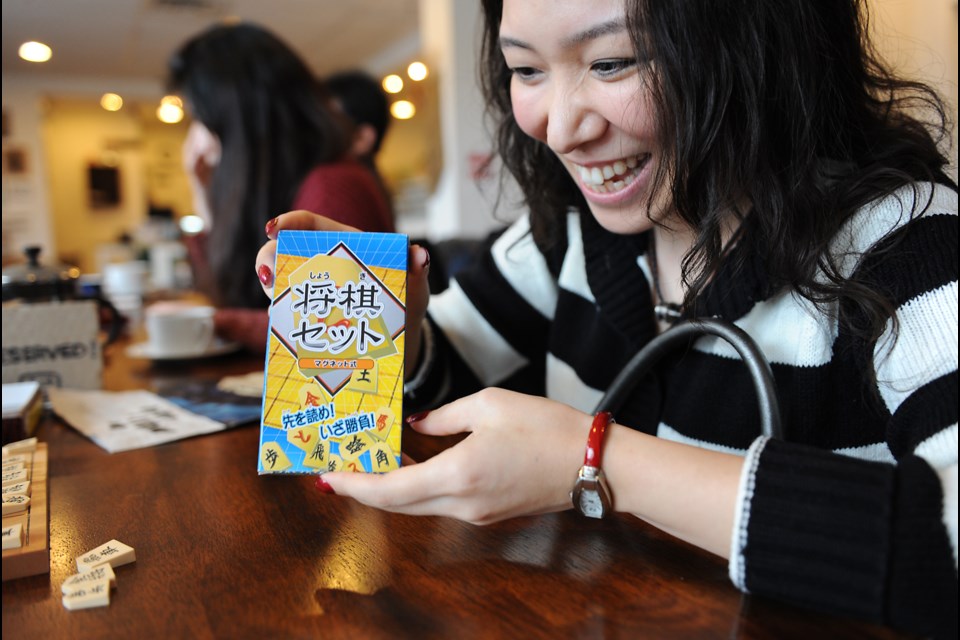Like chess, shogi is mostly a quiet game. Both players study the board on a table in front of them, a hand often on the face in the thick of concentration. And then, very much unlike chess, there’s a startling “clack” noise as wood hits wood when a player drops in a piece with a quick flick of the fingers.
Devon Rowcliffe runs the Vancouver Shogi Club, which hosts games one Saturday every month at Moii Café on Cambie Street, both for experienced players and for those who want to learn the basics of Japanese chess.
Rowcliffe, who spent many hours as a young boy playing chess with his father, is now familiar enough with the Japanese game to play but admits he’s not an expert by any stretch as he spends much of his spare time promoting the club.
“Most of these guys school me,” he said during last Saturday’s open table at Moii where three boards were set-up amid the café’s table decorations of a model sailboat or two. “I balance promoting the club as well as learning myself. When I first learned to play chess, I was not even aware there were chess variants at the time. The fact that you could drop in a piece kinda blew my mind.”
Rowcliffe was a teenager when he heard about shogi while watching a television drama called Futarikko about a young girl who became a professional shogi player. The 500-year-old game stuck in his head, especially the part about the drop-in rule where, as with chess, pieces can be captured but, unlike chess, captured pieces can be brought back into play by the opposition. So Rowcliffe decided to do some research.
“I learned that Vancouver had a club, but it was dormant. Toronto and Montreal had clubs, but they were also dormant. There was a Canadian Shogi Federation, but that also went dormant,” Rowcliffe said. “One by one all the shogi clubs in Canada went dormant and there was nothing. So I decided I wanted to play and, well, the club was dormant, so I decided that I’ll relaunch it.”
The Vancouver Shogi Club came back to life last month, following Rowcliffe’s game plan of hosting two open games a month — one at Moii and the other at Burnaby’s Nikkei National Museum and Cultural Centre where a former North American shogi champion started the morning with a lesson (similar to some martial arts experienced professionals also go by ranks of kyu while amateurs go by ranks of dan).
The game has a strong history in Vancouver. The club was founded in 1968 by player Makoto Kumano and was the first shogi club outside of Japan to be officially recognized by the Japan Shogi Association. Interest was lost over the years mostly because the players grew old and nothing much was done in the way of recruiting, especially as the game was the domain of men.
“One of the downsides to the former shogi club was that it was all Japanese males,” said Rowcliffe. “So I thought I’d like to open it to many different backgrounds, different genders…”
The international game has also kept up with the times, as evidenced by the fourth annual Women’s Oza Championship in Tokyo later this year. Japan already has seven title tournaments for men. At Saturday’s open game, there were equal numbers of men and women, including Rowcliffe’s wife Nanhee Kim who was mid-match against Tom Furukawa.
“I like the challenge, I like playing so I can get a better idea of the game,” said Kim. “It was frustrating at the beginning, I couldn’t understand how the promotion of the pieces worked, or where to drop them. But I needed to find a new hobby, and I like to use my brain.”
Asked about the fun of the game, both players answered in unison: “The patience.”
The Vancouver Shogi Club meets again March 8 at the Nikkei Centre and March 22 at Moii Café. For more information, visit shogivancouver.wordpress.com/



